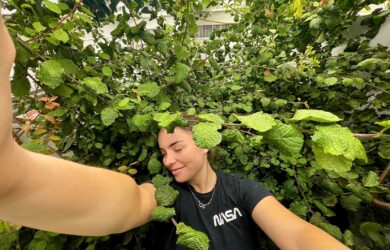
New study shows links between stigma attached to crime and intergenerational crime.
If special consideration has to be given to children of convicted parents, it is preferable that this is positive and focused on preventing the offending behaviour.
Sytske Besemer
Children of people with criminal records are significantly more likely to offend themselves and more likely to reoffend due to the stigma they face, according to a new study.
The study, Labeling and Intergenerational Transmission of Crime: the Interaction between Criminal Justice Intervention and a Convicted Parent, is the first in 25 years to investigate how the stigma surrounding offenders affects their offspring.
Based on research conducted at the University of Cambridge’s Institute of Criminology, it is published today in the journal PLOS ONE. It looks at whether the criminal justice system may make it more likely that offenders’ children turn to crime.
The researchers, led by Gates Cambridge Scholar Sytske Besemer, investigated both ‘labelling’ and intergenerational transmission of crime, that is, whether those with a criminal record are more likely to report later offending behaviour. They found links between later offending behaviour and the label attached to offenders – which might make them conform to the criminal stereotype, identify more with deviant social groups or push them into a criminal lifestyle due to barriers to getting or keeping a job.
They also found a strong relationship between parental crime and later offending behaviour, with children of offenders almost twice as likely as the average person to offend. The researchers say that there are complex factors that drive criminal behaviour, but that there is a cumulative effect of such factors. The study was based on a sample of mainly white men born in London in the 1950s.
The researchers say their findings show the need for interventions targeted at children of convicted parents, such as parent education and parent management training. They say research shows the benefits of such programmes and that they are cost effective. The benefits include reducing crime, keeping children in school for longer and boosting health and employment outcomes.
They state: “If special consideration has to be given to children of convicted parents, it is preferable that this is positive and focused on preventing the offending behaviour.”
Sytske Besemer [2008] did her PhD in Criminology at the University of Cambridge and is currently a Visiting Research Scholar at UC Berkeley and is a criminal justice researcher in Uber's Trust & Safety Research Team in San Francisco.
*Picture credit: Wikimedia Commons

Sytske Besemer
- Alumni
- Netherlands
- 2008 PhD Criminology
- Jesus College
Before coming to Cambridge I studied psychology and criminology in Leiden and Amsterdam. For my PhD I investigated mechanisms explaining the intergenerational transmission of violent and criminal behaviour. Why do children of criminal/aggressive parents have a higher risk of showing similar behaviour? I contrasted several explanations for this intergenerational continuity such as social learning, official bias against certain families, and the transmission of risk factors. I investigated this in England as well as in the Netherlands. By doing this I hope to contribute to knowledge about the development of aggression and criminal behaviour, which can help to design interventions against such behaviour. I am fascinated by human development of which these types of behaviour are just one part. During my post-doc at UC Berkeley I continued this line of research and also looked at the opposite: how does children's problem behavior impact on parenting practices? I then transitioned into industry as a ux researcher and after Uber and Facebook I now work at a startup called Cradle (cradle.bio), where we want to use machine learning to make it faster,easier and cheaper to design proteins.












